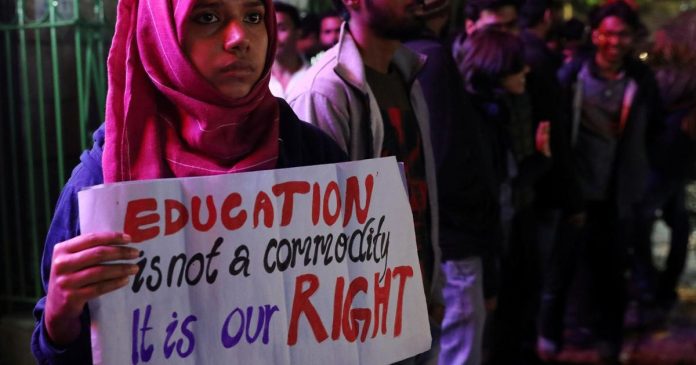As nationwide protests over the Waqf Act intensify, the Muslim community finds itself grappling with yet another blow—this time to its educational future. The BJP-led Central Government has quietly dismantled several schemes specifically designed to uplift Muslims academically and socio-economically, deepening the community’s fears of systemic marginalization.
Amid rising bulldozer politics and disregard for court orders protecting Muslim homes and places of worship, educational support structures built over decades have also begun to crumble. With the scrapping of key schemes like the Maulana Azad National Fellowship, Pre-Matric Scholarship (Classes 1–8), “Padho Pardes,” and the shutting down of the Maulana Azad Education Foundation, access to quality education for thousands of underprivileged Muslim students is rapidly eroding.
These initiatives were a response to the alarming findings of the 2006 Sachar Committee Report, which exposed the poor socio-educational conditions of Indian Muslims. While the previous UPA government launched targeted schemes to bridge this gap, the current regime has gradually withdrawn these lifelines, citing vague reasons such as “overlaps with other schemes.” Experts say this rationale masks a deeper, more troubling agenda.
The implications are stark. With the cancellation of fellowships and overseas study schemes, Muslim youth are now increasingly unable to pursue higher education or access international academic exposure. The narrowing scope of the Pre-Matric Scholarship undermines early education, raising concerns about growing dropout rates in Muslim-majority localities. The closure of the Maulana Azad Foundation has also dealt a major setback to efforts focused on Muslim women’s education and empowerment.
Additionally, financial support for madrasas—critical for both religious and basic education—has been slashed, leaving many institutions struggling for survival. Critics argue that this is part of a broader strategy to dilute Muslim cultural and educational spaces under the pretext of reform or rationalization.
Community leaders and educationists are urging immediate grassroots action. They emphasize the need to channel zakat and charity toward educational causes, establish community-run scholarship programs, and create awareness on the importance of modern education alongside religious learning. There are also calls for political mobilization and advocacy to demand the restoration of these schemes and protections for minority rights.
“This isn’t just a policy shift; it’s a deliberate attempt to push Muslims further into socio-political invisibility,” said an education activist in Mumbai. “But it must also be seen as a wake-up call. Now is the time for the community to invest in its own future.”
In the face of adversity, the Muslim community is being reminded that education is not just a right—but an obligation. If today’s children are being denied opportunities, it is upon the community to create new ones. Lighting the lamp of knowledge in every home is now more than a dream—it is a necessity.




